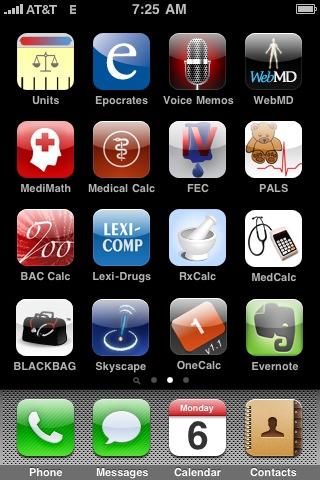I finally had an opportunity to roam around the exhibit hall at the ASHP Midyear today. Of course I had to sacrifice a session to attend, but it was worth it. If you’ve never been in the exhibit hall at one of these events you owe it to yourself to check it out.
Drug information
Pharmacist perception of Wikipedia as a drug information resource
The Annals of Pharmacotherpy (Vol. 43, No. 11, pp. 1912-1913): “Approximately 80% of pharmacists use the Internet to obtain drug information.1 Wikipedia, often found at the top of Internet search results, is a free-access, collaborative, online encyclopedia that can be edited by anyone.2 Incidents of vandalism have occurred, since the site allows anyone to contribute. … Read more
Drug information resources
Below is a list of drug information resources for both mobile devices and online access. I’ve used most, but not all, of these resources and have found the mobile versions to be a valuable resource when you’re on the go. While it is possible to access the online versions of these resources via a smartphone, the mobile applications are designed with the smaller screen in mind and therefore, in my opinion, work better then the online versions when using a mobile device.
Let me know if I missed any. Also feel free to comment on your favorite.
Are e-patients better informed or just harder to treat?
I found an interesting article at EHR Bloggers that talks about the possibility of easy access to information via the internet resulting in difficult-to-treat patients and higher healthcare costs. The concern raised in the NPR article describes the effect of information dissemination without context or interpretation – it happens anyway, with direct-to-consumer advertising in all … Read more
Lexi-comp making headway on drug information software for the Palm Pre
Earlier today Lexi-comp offered a sneak peak of their new drug information software for the Palm Pre. That’s exciting news for all you Palm Pre owners out there. Lexi-comp offers one of the most comprehensive drug information packages available and is certainly a favorite among pharmacists. The Palm Pre is a great device to use … Read more
“What’d I miss?” – Week of October 4th
As usual there were a lot of things that happened during the week, and not all of it was pharmacy or technology related. Here’s a quick look at some of the stuff I found interesting.
Getting pharmacists to lay down their 3×5 cards
The decentralized pharmacy model brings with it the opportunity for pharmacists to be an integral part of the medical team. This includes following teams of healthcare provides, physicians, nurses, respiratory therapists, etc, on morning rounds. And like all good little pharmacists we like to be prepared with as much information as possible about the patient. Several methods for collecting data have been developed over the years, including the all time favorite; the 3×5 index card. The problem with this system is obvious; it’s prone to human error. Taking information from one source and transcribing it somewhere else simply increases the chance for error. In addition, the information may be inaccurate as things can change rapidly with hospitalized patients, especially in areas like the ICU.
Wikipedia as a drug reference….bad idea.
Medicine 2.0 Congress blogspot : “Readability of the Top 50 Prescribed Drugs in Wikipedia – Devin explained that a sample of 50 most prescribed drug in United State were selected and the content related to those prescribed drugs in Wikipedia were indentified and saved as HTML files for evaluation. Each Wikipedia entry was analyzed independently … Read more
Best iPhone / iPod Touch Applications for Pharmacists
 The iPhone and iPod Touch have created quite a wave in healthcare, and along with the wave has come a plethora of healthcare applications. The user interface on the iPhone/iPod Touch combined with the ease of accessing applications on Apple’s iTunes store and the relatively inexpensive nature of most applications, have made these devices a favorite among healthcare professionals.
The iPhone and iPod Touch have created quite a wave in healthcare, and along with the wave has come a plethora of healthcare applications. The user interface on the iPhone/iPod Touch combined with the ease of accessing applications on Apple’s iTunes store and the relatively inexpensive nature of most applications, have made these devices a favorite among healthcare professionals.
With the volume of healthcare related applications available, I’m surprised at how few I actually use. I spend quite a bit of time surfing the app store looking for new applications that I can apply to pharmacy. I’ve downloaded numerous applications, but have deleted most for one reason or another.
My “research” has led to the list below of applications that I find most useful as a pharmacist.
Cool Technology for Pharmacy
Lexi-Drugs for the iPhone: “.. our most comprehensive drug database, with content that addresses all patient populationsand covers clinical specialties such as Pharmacy, Internal Medicine, Cardiology, Oncology, Psychiatry, Anesthesiology, and others. Independently ranked as the #1 drug database for the PDA, Lexi-Drugs includes up to 67 fields of  information, including Adverse Reactions, Canadian Brand Names, Contraindications, Dosing, Medication Safety Issues,  Pharmacodynamics and Kinetics, Special Alerts (including new FDA warnings), plus International BrandNames from 125 countries. Includes drug pricing.”